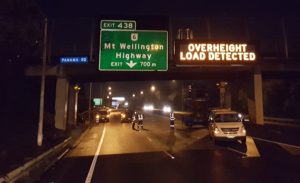Peter Bathgate has been working on the Southern Motorway, currently commissioning the Over Height Detection and Warning System (OHDWS) to protect Penrose Rd over bridge from damage.
New full colour VMS’s will display large text and flashing indicators to advise illegal drivers to leave the motorway.
The system will be connected to ATOC Smales control room to alert Operators so that they can advise Police and dispatch AMA incident response.
In a recent AMA ‘Motorway Matters’ session attended by Brett Gliddon, a photo of the new ‘OVERHEIGHT LOAD DETECTED’ sign was shown along with a video of the first successful activation of part of the system, where trucks triggered two of the VMS, at Panama Rd over bridge and Mt Wellington (northbound) which displayed, ‘LOAD TOO HIGH TAKE NEXT EXIT,’ followed by the truck leaving the motorway as instructed.
The project also won an innovation award for the new bridge-mount structures, which allow technicians to maintain the sign from the local road, eliminating the need for costly traffic management and inconvenience to road users.




